|
|
|
Sort Order |
|
|
|
Items / Page
|
|
|
|
|
|
|
| Srl | Item |
| 1 |
ID:
106631
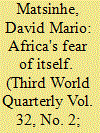

|
|
|
|
|
| Publication |
2011.
|
| Summary/Abstract |
Since the collapse of apartheid, the figure of Makwerekwere has been constructed and deployed in South Africa to render Africans from outside the borders orderable as the nation's bogeyman. Waves of violence against Makwerekwere have characterised South Africa since then, the largest of which broke out in May 2008 in the Johannesburg shantytown of Alexander. It quickly spread throughout the country. The militants were black citizens who exclusively targeted African foreign nationals, with some witnesses reporting grotesque scenes of sadistic behaviour. So far these violent spurts have been described as xenophobia, overlooking the history of colonial group relations in South Africa. From the perspective of this article, the history of colonial group relations cannot be overlooked, for the relations between citizens and non-citizens are extended shadows of this history. I argue that, rather than rushing to characterise these relations as xenophobia, we should factor in the history of colonial group relations and the extent to which the post-apartheid ideology of Makwerekwere and South Africa's 'we-image' vis-à-vis the rest of Africa may bear the imprints of this history.
|
|
|
|
|
|
|
|
|
|
|
|
|
|
|
|
| 2 |
ID:
142994
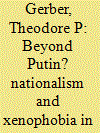

|
|
|
|
|
| Summary/Abstract |
The role of nationalism within the Russian public is an under-examined but potentially important aspect of the crisis surrounding Russia's annexation of Crimea and its continuing involvement in eastern and southern regions of Ukraine. As commentators have sought to comprehend President Vladimir Putin's motives, many have asserted or assumed that such actions enjoy tremendous Russian public support. Indeed, public opinion polls from Russia indicate that Putin's popularity soared in the wake of the Crimean annexation and that large majorities have supported the government's policies in Ukraine, sympathizing with the Kremlin's negative portrayals of U.S. motives and actions.1 However, it is not clear whether this wave of public support is a fleeting “rally around the flag” phenomenon or the result of an organic, deeper tendency toward nationalism and xenophobia in the Russian public.
|
|
|
|
|
|
|
|
|
|
|
|
|
|
|
|
| 3 |
ID:
094441
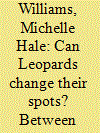

|
|
|
|
|
| Publication |
2010.
|
| Summary/Abstract |
Racism and xenophobia have fueled radical right-wing party electoral success across Western Europe. This article investigates whether key changes have occurred in radical right-wing xenophobia in recent years, mainly a moderating trend and a shifting out-group focus. The analysis in this article suggests such a 21st-century transformation. Radical right-wing party programmatic orientations have moderated and their appeals have broadened. The out-groups and immigrant enemies of the postwar era have been superseded, especially as anti-Semitism has been traded for anti-Muslim Islamophobia. Populism is explored in its potential causal logic for observed changes.
|
|
|
|
|
|
|
|
|
|
|
|
|
|
|
|
| 4 |
ID:
157764
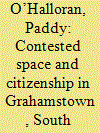

|
|
|
|
|
| Summary/Abstract |
This paper discusses two distinct political mobilisations of October 2015 in Grahamstown, Eastern Cape Province, South Africa. Student protests against racial, class-based, and gender-based oppression coincided with xenophobic violence in the city. These events demonstrated both challenges to and continuity with the long history of politics in Grahamstown, a history marked by the contestation and control of space, race, and citizenship. The paper argues for the continued relevance of these themes to thinking about contemporary South African politics. By considering together the two events of October 2015, we can interrogate aspects of colonial political continuities in post-1994 South Africa which variously influence mass protest action for democratic opening, anti-democratic violence, and state responses to both.
|
|
|
|
|
|
|
|
|
|
|
|
|
|
|
|
| 5 |
ID:
187342
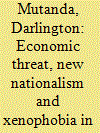

|
|
|
|
|
| Summary/Abstract |
The perceived economic threat has given rise to narrow nationalism in South Africa, which has given birth to direct, cultural and structural forms of violence, commonly referred to as xenophobia, which is actually Afrophobia. The main argument is that in as much as there is evidence of the influx of mainly African migrants in South Africa, and these have been largely accused of various crimes and contributing to rising unemployment, this perception trivialises the need for a multipronged and people-centred approach to South Africa’s and Africa’s underlying domestic challenges. Xenophobia should not be seen as only a South African but also an Africa problem, which consequently requires a national and continental response strategy. This then implies that South Africa has a role in stemming the challenges that have given impetus to a new form of narrow nationalism. On the other hand, the article attempts to explain what a continental response strategy might entail. In fact, the narratives of African migrants as pervasive criminals and job snatchers conveniently relieves the post-apartheid government which is expected to enhance service delivery and create opportunities for the locals, as well as giving dignity to the immigrants.
|
|
|
|
|
|
|
|
|
|
|
|
|
|
|
|
| 6 |
ID:
175824
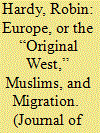

|
|
|
|
|
| Summary/Abstract |
This article examines the effects of colonialism and decolonization on Muslim migration to Europe. With French imperialism and West Africa as reference points, this study demonstrates that a peculiar relationship arose between ruler and ruled and addresses the broader implications of this historical development for European-Muslim relations today. Beyond its fears of terrorism as well as the added costs associated with providing social benefits to settled and migrant Muslim communities, a contingent of Europeans seeks that immigrants will adopt Western cultural traits which directly confronts Muslims who wish to retain their traditional Islamic lifestyles. Complexifying standard postcolonial analyses, this study highlights the ways in which colonizer and colonized collaborated and co-benefited, both beholden to a past that is not easily transcended.
|
|
|
|
|
|
|
|
|
|
|
|
|
|
|
|
| 7 |
ID:
155362
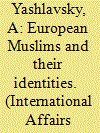

|
|
|
|
|
| Summary/Abstract |
IN THE MID-2010S, the problems related to European Muslims intensified under pressure of the migration crisis and terrorist acts carried out by religiously motivated extremists in some European countries. Hence a closer attention to the far from simple relations between Europe and the Islamic world and to their dimensions: demographic, migration, cultural, political, ideological, social, economic, etc. The scope of an article inevitably narrows down the range of the problems discussed.
|
|
|
|
|
|
|
|
|
|
|
|
|
|
|
|
| 8 |
ID:
155526
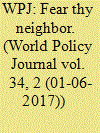

|
|
|
| 9 |
ID:
127045
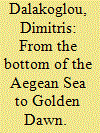

|
|
|
| 10 |
ID:
185644
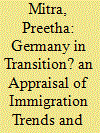

|
|
|
|
|
| Summary/Abstract |
This article examines Germany’s response to the European migrant crisis of 2015–2016 by analysing immigration and identity debates in Germany and their impact on German politics. The refugee crisis sharply divided the European Union and raised questions relating to immigration, humanitarian assistance and the duties towards those fleeing war and persecution. In such a scenario, Chancellor Angela Merkel’s decision to admit more than a million refugees had deep ramifications not only for German politics but also European and international politics at large. After the initial wave of support subsided, xenophobic and right-wing factions emerged, and public opinion began to turn against Merkel. The emergence of such sentiments is at odds with Germany’s complicated relationship with nationalism and right-wing politics in the post-war era. It is this juxtaposition that the article aims to analyse; whether the response to the refugee crisis proves that Germany is on the path to becoming a more inclusive society despite the presence of deep-rooted xenophobic elements. In order to do so, this article has focused on the complex relationship between party politics, immigration trends and identity debates in Germany and its impact on contemporary German politics as a whole.
|
|
|
|
|
|
|
|
|
|
|
|
|
|
|
|
| 11 |
ID:
140429
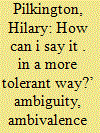

|
|
|
|
|
| Summary/Abstract |
Although survey data identify no significant predictor of intolerance among the Russian population, young people are considered to display heightened levels of ethnic intolerance and radical variants of xenophobia. Drawing on survey and semi-structured interview data from a study of patriotism among young people in two cities in the North-West region of Russia, this article explores the strength of ethnic self-identification and ethnically exclusive notions of Russianness and compares levels and forms of ethnic intolerance. Identifying that routine expression of xenophobic sentiments coexists alongside a commitment to principles of ethnic equality, the article considers what the ambiguities and contradictions in the articulation of intolerance tell us about how young people negotiate complex contemporary multicultural societies.
|
|
|
|
|
|
|
|
|
|
|
|
|
|
|
|
| 12 |
ID:
131250
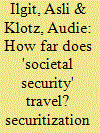

|
|
|
|
|
| Publication |
2014.
|
| Summary/Abstract |
Responding to political developments in Europe during the 1990s, the Copenhagen School drew on speech act theory to argue that state leaders represent certain issues, including immigration, as existential threats to society. Two decades of friendly amendments and vociferous critiques have raised questions about how well the Copenhagen School's core concept of 'societal security' travels outside Europe. To assess the scope of this 'securitization' framework more systematically, we examine South Africa, a democracy that recently liberalized its immigration policies despite ethno-nationalist and racist traditions. Specifically, we test four claims: (1) that official discourses will target certain foreigners as an existential threat to collective identity; (2) that bureaucracies will consistently institutionalize these discourses; (3) that identity-oriented groups will be crucial to any societal contestation over these discourses; and (4) that successful securitization produces regionalization. These securitization claims hold up well, even though the nature of threats to societal security shift over time. Keeping in mind that no theory is without weaknesses, we recommend wider integration of the societal security concept into comparative studies of immigration policy, especially in democracies outside Europe.
|
|
|
|
|
|
|
|
|
|
|
|
|
|
|
|
| 13 |
ID:
117878
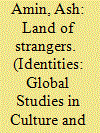

|
|
|
|
|
| Publication |
2013.
|
| Summary/Abstract |
This paper summarises a core theme running through the author's book Land of Strangers selected for discussion in this symposium. It examines the politics of intolerance towards minorities and migrants in multicultural and multiethnic Europe. It dissents from the prevailing view that this politics is symptomatic of a breakdown of social cohesion, in need of correctives of community, contact and border closure. Instead, the paper locates this development in a new 'catastrophist' biopolitics of risk and uncertainty that descends on the figure of the stranger, tapping into an ingrained vernacular of phenotypical racism. Accordingly, the paper argues for a politics of the commons that makes space for, and publicises, rituals of cohabitation, the shared commons, a welfarist biopolitics and other collective interventions that might strengthen civilities of indifference to difference.
|
|
|
|
|
|
|
|
|
|
|
|
|
|
|
|
| 14 |
ID:
157763
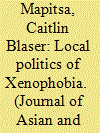

|
|
|
|
|
| Summary/Abstract |
Drawing on research from five peri-urban sites across South Africa on how local government is responding to mobility, this research explores how xenophobia is being produced by local governance processes and structures. Building a better understanding of the mechanisms of exclusion in local government is essential not only for planning interventions that may strengthen democracy, but to understand how the daily practices of local government can promote, or undermine democracy.
|
|
|
|
|
|
|
|
|
|
|
|
|
|
|
|
| 15 |
ID:
157958
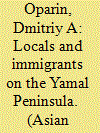

|
|
|
|
|
| Summary/Abstract |
Western Siberia and the entire Arctic region have been a beacon for migrants from the European part of Russia, from the national republics and the southern regions of Siberia in the post-war era. In contrast with the other regions of Siberia, the oil- and gas-rich North remains a magnet for migration from the entire former Soviet Union to this day. This paper presents research into the contemporary sociocultural environment of Yar-Sale, the administrative centre of the Yamal district of Yamalo-Nenets Autonomous Okrug. The research focuses on the migrational experiences of ‘new’ migrants and their relations with the native Nenets population. Special attention is paid to concepts such as ‘local’/‘immigrant’, and ‘insider’/‘outsider’. The author holds that the boundaries between these categories are flexible. An immigrant may become a local and an insider may become an outsider, with ethnicity far from always being the deciding factor.
|
|
|
|
|
|
|
|
|
|
|
|
|
|
|
|
| 16 |
ID:
177559
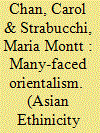

|
|
|
|
|
| Summary/Abstract |
Ethnic Chinese and Asians have historically been excluded, invisibilized, or experienced conditional inclusion in South America. In Chile, the global pandemic provoked an increase in older patterns of anti-Chinese racism and anti-China sentiments. Orientalist and racist discourses have gone uncriticized, although anti-China statements by politicians and academics have provoked diplomatic backlash. Contextualizing the history of orientalism and representations of Chineseness in Chile, we show that dominant political and cultural discourses during COVID-19 strongly reproduce the dichotomy between the ‘Oriental’ and ‘Occidental.’ The pandemic reveals the superficial and problematic nature of the government’s recent attempts to articulate multiculturalism in an era of ‘rise in China’ tropes.
|
|
|
|
|
|
|
|
|
|
|
|
|
|
|
|
| 17 |
ID:
102770
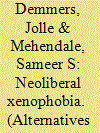

|
|
|
| 18 |
ID:
153294
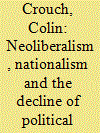

|
|
|
|
|
| Summary/Abstract |
The three great Western political traditions (conservatism, liberalism, social democracy) incorporate three of the four possible combinations of the core political axes: traditional, unchanging authority versus the challenge of change, and egalitarianism versus inegalitarianism. The fourth possibility—egalitarian conservatism—has appeared in various guises, but has usually become submerged within the right, including its most authoritarian forms. Current xenophobic movements claiming to represent those suffering from excessive change—for example, those involved in the UK's EU referendum and Donald Trump's victory in the USA—are seeing an apparent resurgence of this neglected tradition. What are its implications for politics in general?
|
|
|
|
|
|
|
|
|
|
|
|
|
|
|
|
| 19 |
ID:
151146
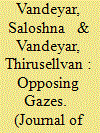

|
|
|
|
|
| Summary/Abstract |
Utilising a qualitative case study approach, this research study set out to understand discrimination experienced by immigrant students in their interactions with South African students and the prejudice immigrant students expressed against Black South African students. Findings reveal that the discrimination experienced by immigrant students could be clustered into four broad themes, namely categorisations and prototypes; practised stereotypes; academic and social exclusion; and work ethic. Furthermore, statements immigrant students make about South African students seem to fall into two broad categories, namely lack of value for moral integrity and lack of value for education. Educating students to value human dignity and to view each other as cosmopolitan citizens of the world could be a way to ensure social cohesion and harmony of future generations to come.
|
|
|
|
|
|
|
|
|
|
|
|
|
|
|
|
| 20 |
ID:
182911
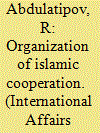

|
|
|
|
|
| Summary/Abstract |
THE Organization of Islamic Cooperation (OIC) is the second-largest international organization after the United Nations and was created to ensure the unity of the ummah, defend it, and advance its interests. The OIC seeks to promote moderate Islam, interreligious dialogue, and sociocultural harmony both in Muslim countries and in non-Muslim countries where there are Muslim minorities. The OIC strives to combat Islamophobia, which for a long time has been a systematic policy in parts of the world, primarily in leading Western countries (the US, Canada and European Union nations), where there are old and growing trends to oust Islam from society, discriminate against it, and fan anti-Islamic sentiments...
|
|
|
|
|
|
|
|
|
|
|
|
|
|
|
|
|
|
|
|
|